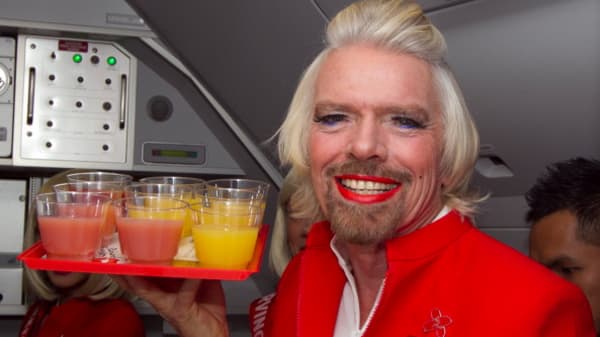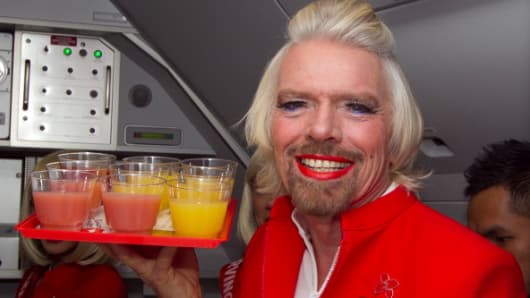Virgin chief executive Richard Branson made his debut as a female flight attendant this weekend, donning a stewardess' uniform and serving drinks to passengers after he lost a bet with a fellow airline magnate.
The Virgin Group founder was honoring a bet made with Air Asia's CEO Tony Fernandes over whose team would win the 2010 Formula 1 Grand Prix in Abu Dhabi.
Shaving his legs for the bet but keeping his beard, Branson wore heels, false eyelashes, makeup and red lipstick while serving customers on an Air Asia flight from Perth to Kuala Lumpur.
Branson said he got "off to a bad start" when he dropped drinks on a passenger's lap. "I think this might be my last flight so I'm going to make the most of it," he said.
Turning to more serious aviation matters in an interview with CNBC on Monday and alluding to the recent sale of a 49 percent stake in his airline Virgin Atlantic to the U.S carrier Delta Air Lines, Branson spoke about consolidation within the aviation sector.
(Read More: Branson: United Tried to 'Damage Us' With 40% Fare Cut)
"I'd always been against big consolidation because I thought it was not in the consumers' interest; the more airlines that are competing with each other, the better it is for the consumer. But governments around the world have not listened to that argument and therefore you've now got enormous airlines that have been created, and we decided the join them," he told CNBC in Singapore.
Branson spoke about his new initiative called the "carbon war room" which aims to harness entrepreneurship that tackles carbon emissions.
(Read More: Jump! Richard BransonWants to Skydive From Space)
"The idea of the carbon war room is to try to unite all the businesses around the world that are emitting carbon to come up with imaginative ideas to reduce their carbon output without damaging the industry," he said.
Green initiatives could be economically viable, he added, and governments should encourage the industry to play a part in tackling climate change.
"What we think governments should do is really help the industries that are trying to get going; that are creating industries that will tackle the problem but that won't emit carbon," he said.
"So don't tax the solar industry, don't attack the fledgling battery car industry. [They should] try to encourage all the new industries like that to get up and going. And some governments are doing that well and others seem to be doing very little."




